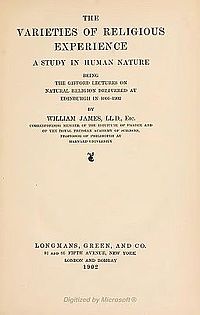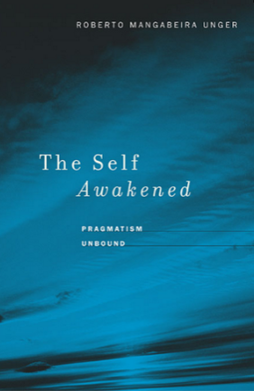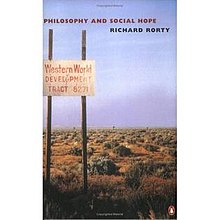
Pragmatism is a philosophical tradition that considers words and thought as tools and instruments for prediction, problem solving, and action, and rejects the idea that the function of thought is to describe, represent, or mirror reality. Pragmatists contend that most philosophical topics—such as the nature of knowledge, language, concepts, meaning, belief, and science—are all best viewed in terms of their practical uses and successes.

Richard McKay Rorty was an American philosopher. Educated at the University of Chicago and Yale University, he had strong interests and training in both the history of philosophy and in contemporary analytic philosophy. Rorty's academic career included appointments as the Stuart Professor of Philosophy at Princeton University, Kenan Professor of Humanities at the University of Virginia, and Professor of Comparative literature at Stanford University. Among his most influential books are Philosophy and the Mirror of Nature (1979), Consequences of Pragmatism (1982), and Contingency, Irony, and Solidarity (1989).

Susan Haack is a distinguished professor in the humanities, Cooper Senior Scholar in Arts and Sciences, professor of philosophy, and professor of law at the University of Miami in Coral Gables, Florida.

Robert Boyce Brandom is an American philosopher who teaches at the University of Pittsburgh. He works primarily in philosophy of language, philosophy of mind and philosophical logic, and his academic output manifests both systematic and historical interests in these topics. His work has presented "arguably the first fully systematic and technically rigorous attempt to explain the meaning of linguistic items in terms of their socially norm-governed use, thereby also giving a non-representationalist account of the intentionality of thought and the rationality of action as well."
Anti-foundationalism is any philosophy which rejects a foundationalist approach. An anti-foundationalist is one who does not believe that there is some fundamental belief or principle which is the basic ground or foundation of inquiry and knowledge.

The Varieties of Religious Experience: A Study in Human Nature is a book by Harvard University psychologist and philosopher William James. It comprises his edited Gifford Lectures on natural theology, which were delivered at the University of Edinburgh, Scotland between 1901 and 1902. The lectures concerned the psychological study of individual private religious experiences and mysticism, and used a range of examples to identify commonalities in religious experiences across traditions.
Neopragmatism, sometimes called post-Deweyan pragmatism, linguistic pragmatism, or analytic pragmatism, is the philosophical tradition that infers that the meaning of words is a result of how they are used, rather than the objects they represent.
Postanalytic philosophy describes a detachment from the mainstream philosophical movement of analytic philosophy, which is the predominant school of thought in English-speaking countries. The Internet Encyclopedia of Philosophy defines the movement as denoting "philosophers who owe much to Analytic philosophy but who think that they have made some significant departure from it." The movement cannot be unified into a single positive project as it is defined it terms of what it stands against, although it has generally been seen as bridging the gap between analytic and continental philosophy.

Achieving Our Country: Leftist Thought in Twentieth-Century America is a 1998 book by American philosopher Richard Rorty, in which the author differentiates between what he sees as the two sides of the left, a cultural left and a reformist left. He criticizes the cultural left, which is exemplified by post-structuralists such as Michel Foucault and post-modernists such as Jean-François Lyotard. Although these intellectuals make insightful claims about the ills of society, Rorty holds that they provide no alternatives and even present progress as problematic at times. On the other hand, the progressive left, exemplified for Rorty by John Dewey, makes progress its priority in its goal of "achieving our country." Rorty sees the reformist left as acting in the philosophical spirit of pragmatism.
Giovanna Borradori is Professor of Philosophy and Media Studies at Vassar College. Borradori is a specialist in Social and political theory, Aesthetics, and the philosophy of terrorism. A crucial focus of her work is fostering new avenues of communication between rival philosophical lineages, including the analytical and Continental traditions, liberalism and communitarianism, as well as deconstruction and Critical Theory.
Richard Shusterman is an American pragmatist philosopher. Known for his contributions to philosophical aesthetics and the emerging field of somaesthetics, currently he is the Dorothy F. Schmidt Eminent Scholar in the Humanities and Professor of Philosophy at Florida Atlantic University.

The Metaphysical Club: A Story of Ideas in America 2001 book by Louis Menand, an American writer and legal scholar, which won the 2002 Pulitzer Prize for History. The book recounts the lives and intellectual work of the handful of thinkers primarily responsible for the philosophical concept of pragmatism, a principal feature of American philosophical achievement: William James, Oliver Wendell Holmes Jr., Charles Sanders Peirce, and John Dewey. Pragmatism proved to be very influential on modern thought, for example, in spurring movements in modern legal thought such as legal realism.

Richard Jacob Bernstein was an American philosopher who taught for many years at Haverford College and then at The New School for Social Research, where he was Vera List Professor of Philosophy. Bernstein wrote extensively about a broad array of issues and philosophical traditions including American pragmatism, neopragmatism, critical theory, deconstruction, social philosophy, political philosophy, and hermeneutics.

Patricia M. Shields is a Regents' Professor in the Political Science Department at Texas State University. Since 2001 she has been Editor-in-Chief of the international and interdisciplinary journal Armed Forces & Society. She is also a Contributing Editor to Parameters: The US Army War College Quarterly and the Section Editor of the Military and Society section to the Handbook of Military Sciences. Shields is notable for her publications focusing on research methods, civil military relations, gender issues, pragmatism in public administration, peace studies, and the contributions of Jane Addams to public administration and peace theory. She received a BA in Economics from the University of Maryland - College Park, an MA in Economics and a PhD in Public Administration from The Ohio State University.

Amélie Oksenberg Rorty was a Belgian-born American philosopher known for her work in the philosophy of mind, history of philosophy, and moral philosophy.
Dr. Hannah E. Hashkes is an Israeli philosopher of Jewish thought.

The Self Awakened: Pragmatism Unbound is a 2007 book by philosopher and politician Roberto Mangabeira Unger. In the book, Unger sets forth a theory of human nature, a philosophical view of time, nature and reality, and a proposal for changes to social and political institutions so that they best nourish the context-transcending quality that Unger sees at the core of human existence. Written in a prophetic and poetic manner that drew comparison with the work of Whitman and Emerson, and delving into issues of humankind's existential predicament in a manner that one critic found evocative of Sartre, The Self Awakened also serves as a summation of many of the core principles of Unger's work.
David Macarthur is an Australian philosopher and Professor of Philosophy at the University of Sydney who works primarily on skepticism, metaphysical quietism, pragmatism, liberal naturalism and philosophy of art. He has taken up these and other themes in articles on the philosophy of Stanley Cavell, Hilary Putnam, Richard Rorty and Ludwig Wittgenstein.
Ronald A. Kuipers is a Canadian philosopher of religion based in Toronto, Ontario.

Richard Rorty: Contemporary American Thinkers is a 2012 book on the writings of American philosopher Richard Rorty, written by Ronald A. Kuipers. The release of the book marked Bloomsbury's fifth publication in their Contemporary American Thinkers series.











